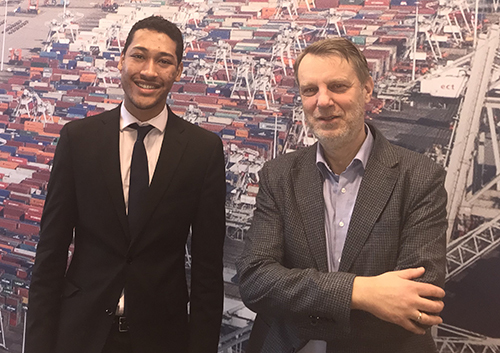Political science major Enzo Ambrose ’21 traveled to Rotterdam last winter to research the logistics preparations for freight trade routes along the English Channel in the wake of a hard Brexit.
This article is part of a series of blog posts published by the Nanovic Institute for European Studies. The Nanovic Navigator is home to stories told by students about their unique experiences in Europe through Nanovic student grant programs. If you have questions about a story, a student, or the Nanovic Institute, please contact Anna Dolezal, student programs assistant manager (adolezal@nd.edu).

As a political science student, I hear about trade all too often without seeing what goes into the actual trade process: the transports that make the process run smoothly, the people that man those transports, the planning that goes into executing sound port operations, the magnitude of paperwork needed, and just how connected we are to that whole process—whether we work directly on it or not.
Though no-deal Brexit’s economic impact on British society has been studied extensively, there has yet to be considerable focus on the broad range of issues facing those in other countries whose livelihoods depend on the delay-free transit of freight across the English Channel. The port cities along the Channel have been largely overshadowed by the legal quagmire that is the border between Northern Ireland and the Republic of Ireland. To what extent will cities along the English Channel be affected if customs checks are applied for the loading and unloading of freight on ferries, or on freight arriving on either side of the Channel Tunnel? Knowing the extent of Brexit’s economic ramifications on the lives of those living in cities reliant on cross-Channel trade should garner greater focus. Are the hard-Brexit projections nearly as cataclysmic as they have been made out to be in reports such as Operation Yellowhammer, or have regional governments and shipping corporations largely accounted for potential border checks as of now? Minimizing the delay of transit for freight across the Channel will be paramount to preserving economic prosperity in European port cities and within the U.K.
Seeking to understand the role that local institutions have in shaping the landscape of U.K./EU relations following Brexit, I endeavored to analyze the procedures that cities along the English Channel were taking in preparation for Britain's departure from the European Union, as well as what impact Britain's exit would have on their local economy, preparation notwithstanding. With funding from a Nanovic Institute Winter Travel & Research Grant, I conducted research on trade operations in Rotterdam, a major port city in South Holland, Netherlands. My most informative meeting was with Maurits van Schuylenberg, the logistics programs manager for the Port of Rotterdam. He detailed how the Port of Rotterdam normally runs and what preparations they made back in October for the-then potential hard Brexit. He also outlined the Port’s comprehensive plan to cover everything from the operations of the massive container ships to parking for vans arriving from other countries looking to use the port.

Enzo Ambrose ’21 with Maurits Van Schuylenberg, Logistics Programs Manager for
the Port Of Rotterdam
I was surprised to learn the number of jobs that needed to be filled in such a short time due to Brexit. For the Port of Rotterdam alone, nearly 1,000 customs personnel were needed and 80-90 veterinarians to handle the customs procedures with Britain and the trade of livestock. Trade with Britain only amounts to 8% of the port’s operations, yet over 1000 new positions had needed to be filled on short notice to maintain the current rate of trade with Britain post-Brexit. I had also not fully taken into consideration the impact that these new measures would have on other European countries, including hinterland connections. For example, trucks and trains arriving from Germany and Poland—the EU countries that use the Port of Rotterdam the most—needed to be made aware of the port changes ahead of time so they may have the proper paperwork before arriving.
I had some difficulties with the contacts from some of the businesses I reached out to such as P&O Ferries, which has an office in Europoort, an industrial area along the Port of Rotterdam. I intended to visit P&O to discuss measures the company is taking in Rotterdam to facilitate freight delivery between Rotterdam and Kingston upon Hull, a port city in northeast England. Though I was not able to meet with any P&O representatives, I learned a lot about how businesses operate in Rotterdam through my interview with van Schuylenberg.
A distinct feature of Rotterdam business operations is that land comprising the port, which the Port of Rotterdam owns, is leased to businesses and then the Port handles security and customs for the businesses. Another unique feature of trade operations between the U.K. and countries just across the English Channel is that the majority of trade is “roll-on, roll-off”, also known as RoRo. Under this operation style, trucks roll onto ferries and are then taken to Britain, where they roll off at a British port and onto British highways. The Port of Rotterdam has also developed Portbase, a system created in partnership with the rest of the Dutch ports to have one streamlined system for logistics and customs, and all businesses that use this system.
The Rotterdam government to my surprise is less involved with the process of port preparations than I had thought when I first proposed this project. Since the Port of Rotterdam owns its land, it has some separate jurisdictions from the city of Rotterdam. Therefore, the city of Rotterdam would be far less impacted by Brexit than the Port of Rotterdam, though they had anticipated needing to accommodate more traffic in the future as trucks from the hinterland arrived at the well-prepared Port of Rotterdam instead of going to Calais, France, as they might have before.
Visiting Rotterdam facilitated my understanding of their unique troubles resulting from Brexit. The preparations made by their regional governments and freight corporations have broad-ranging impacts on the economies of their respective countries. My research trip also allowed me to better understand what goes into trade operations. Gaining this research experience was important to me because of my plans to write a senior thesis on the causes and effects of wealth inequality—this project fits nicely into my senior thesis plan because it showcases the reliance of cities on its primary industry, e.g., the shipping industry, and the limited resources available, regardless of the wealth generated by the inter-Channel trading industry. It was rewarding to see how projects such as mine, focused on the localized impacts of Brexit, would gain support from the Nanovic Institute.
Originally published by at nanovic.nd.edu on July 27, 2020.